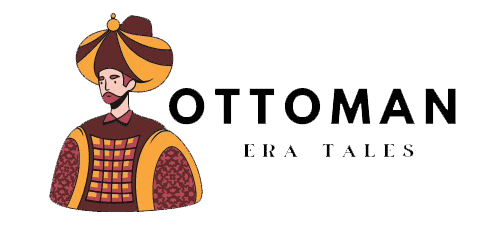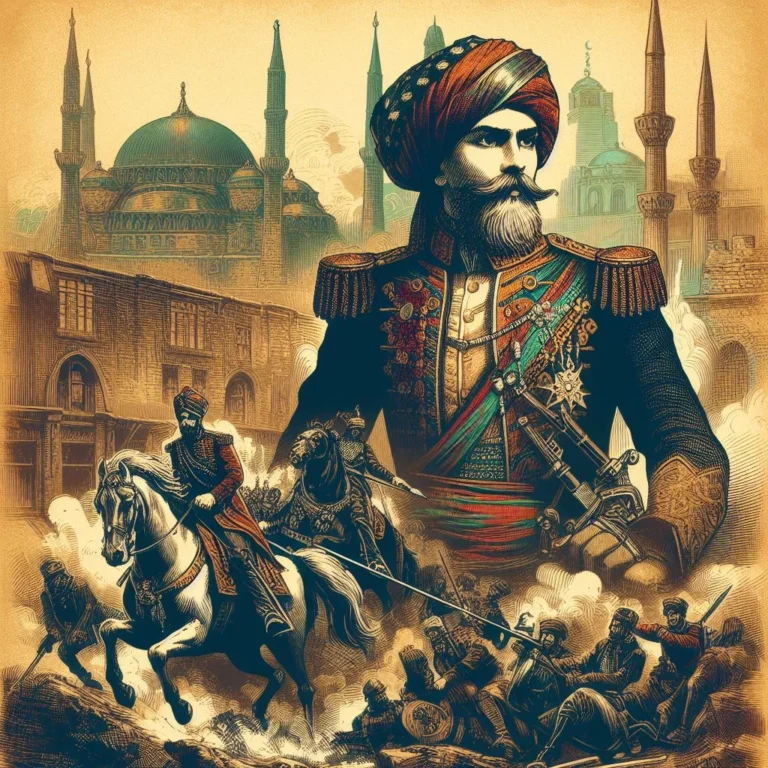Introduction: Who Was Gündüz Bey?
Gündüz Bey was a prominent figure in the early history of the Ottoman Empire, known for his bravery and strategic acumen. As the eldest son of Ertuğrul Ghazi and the elder brother of Osman Ghazi, who later founded the Ottoman Empire, Gündüz played a crucial role in supporting and guiding his younger sibling.
Born into the Kayı tribe, which was a significant branch of the Oghuz Turks, Gündüz was groomed from a young age to be a warrior and a leader, embodying the martial values and traditions of his people.
Throughout his life, Gündüz Bey demonstrated unwavering loyalty and dedication to his family and tribe. His contributions were instrumental during the formative years of the Ottoman state, providing both military and moral support to Osman Ghazi.
Historical accounts and popular media portray him as a courageous and astute leader whose decisions and actions significantly impacted the consolidation of power within the Kayı tribe. Despite not being as prominently recognized as his brother Osman, Gündüz’s legacy is preserved through various historical narratives and cultural depictions.
In contemporary times, Gündüz Bey’s story has been revived and popularized through Turkish historical dramas such as “Diriliş: Ertuğrul” and “Kuruluş: Osman.” These series highlight his bravery, leadership qualities, and his pivotal role in the early stages of the Ottoman Empire’s development.
While historical records about his life and death are sparse and sometimes conflicting, the essence of Gündüz Bey’s contributions remains clear: he was a pillar of strength and wisdom whose influence helped shape the destiny of one of history’s most enduring empires.
Beyond his military prowess, Gündüz Bey was also known for his diplomatic skills and efforts to maintain unity among the various Turkic tribes. His ability to forge alliances and negotiate peace with neighboring tribes and enemies alike was crucial in stabilizing the region during turbulent times.
This diplomatic acumen not only helped secure the survival and growth of the Kayı tribe but also laid the groundwork for the future expansion of the Ottoman Empire under Osman Ghazi’s leadership. Gündüz Bey’s multifaceted legacy as a warrior, leader, and diplomat continues to be an inspiring tale of resilience and dedication.
Early Life and Background of Gündüz Bey
Gündüz Bey was born into the Kayı tribe, a prominent branch of the Oghuz Turks, known for their nomadic lifestyle and martial prowess. The Kayı tribe played a crucial role in the history of the Turkish people, and Gündüz’s lineage was steeped in leadership and valor.
He was the eldest son of Ertuğrul Ghazi, a celebrated leader who led his people through numerous hardships and conflicts, and Hayme Hatun, a respected matriarch. Growing up, Gündüz was exposed to the harsh realities of nomadic life on the Anatolian steppes, which were marked by constant movement, battles for survival, and the quest for new pastures. This environment forged in him a strong sense of resilience, duty, and a warrior spirit that would define his later years.
From a young age, Gündüz Bey was groomed to be a leader. Under the guidance of his father, Ertuğrul, he learned the skills necessary for governance and warfare. Ertuğrul imparted not only tactical and strategic insights but also the values of justice, honor, and loyalty—principles that were central to the Kayı tribe’s ethos. Gündüz’s formative years were filled with rigorous training in horsemanship, archery, and swordsmanship.
He also received a comprehensive education in tribal law and diplomacy, preparing him to handle both internal disputes and external threats. His upbringing was further enriched by the stories and wisdom shared by his mother, Hayme Hatun, who emphasized the importance of unity and perseverance. These early experiences and teachings equipped Gündüz Bey with the qualities necessary to support his family and tribe through the significant challenges they would face in the years to come.
Gündüz Bey’s Role in the Founding of the Ottoman Empire
Gündüz Bey played a pivotal yet often understated role in the early stages of the Ottoman Empire’s foundation. As the elder brother of Osman Ghazi, the empire’s founder, Gündüz was instrumental in providing both strategic and moral support during the initial phases of state-building.
He stood by Osman through numerous battles and political intrigues, offering his experience and wisdom to help navigate the complex landscape of Anatolian tribal politics. Gündüz’s military acumen was crucial in consolidating the power of the Kayı tribe, which served as the bedrock for the nascent Ottoman state.
His ability to lead troops into battle and secure victories against rival tribes and Byzantine forces helped carve out the territorial nucleus that Osman would later expand.
Beyond his battlefield contributions, Gündüz Bey also played a significant role in the governance and administration of the early Ottoman territories. He was involved in key diplomatic efforts, forging alliances with neighboring tribes and negotiating terms of peace and cooperation.
These alliances were vital for the stability and growth of the early Ottoman state, allowing Osman to focus on expansion rather than constant inter-tribal conflicts. Gündüz’s leadership extended to internal affairs as well, where he helped maintain unity and discipline within the Kayı tribe.
His efforts in conflict resolution and justice administration ensured that the tribe remained cohesive and loyal to Osman’s vision. Through these multifaceted contributions, Gündüz Bey helped lay the foundational stones upon which the Ottoman Empire would rise, proving himself to be an indispensable figure in its early history.
Key Battles and Military Strategies of Gündüz Bey
Gündüz Bey was renowned for his tactical brilliance and bravery on the battlefield, which played a crucial role in the early victories that laid the foundation for the Ottoman Empire. One of the most significant battles in which Gündüz Bey showcased his military prowess was the Battle of Domaniç.
This battle was a pivotal conflict against the Byzantine forces, where Gündüz’s strategic use of the terrain and surprise attacks led to a decisive victory. His mastery of guerrilla warfare tactics, such as swift cavalry movements and ambushes, disrupted the enemy’s plans and caused significant losses. These tactics not only ensured immediate victories but also instilled fear and respect among opposing forces, thereby stabilizing and securing Kayı territory.
In addition to his battlefield strategies, Gündüz Bey was adept at fortifying newly acquired territories and managing logistics, which were essential for sustaining prolonged campaigns. He understood the importance of supply lines and established secure routes for transporting provisions and reinforcements. Gündüz also fortified key positions and built defensive structures that protected their lands from potential invasions.
His approach to warfare was holistic, encompassing both offensive and defensive strategies. Moreover, Gündüz Bey was instrumental in training and organizing the Kayı warriors, ensuring they were well-prepared and disciplined. This comprehensive strategy of preparedness, coupled with his innovative combat techniques, enabled the Kayı tribe to not only defend their territories effectively but also to expand and consolidate their power.
Through these key battles and strategic initiatives, Gündüz Bey cemented his reputation as a formidable military leader and a cornerstone in the rise of the Ottoman Empire.
Legacy and Impact of Gündüz Bey on Turkish History
Gündüz Bey’s legacy in Turkish history is one of valor, leadership, and foundational influence. As a key supporter of his brother Osman Ghazi, his contributions were essential in the initial establishment and stabilization of what would become the Ottoman Empire. Gündüz Bey is often remembered for his unwavering loyalty, strategic mind, and ability to inspire and lead his people through challenging times.
His actions helped shape the early political landscape of Anatolia, allowing the fledgling Ottoman state to flourish amidst a turbulent backdrop of competing tribes and empires. The principles of justice, loyalty, and military excellence that he embodied were subsequently woven into the fabric of Ottoman governance and military traditions, influencing generations of leaders who followed.
Moreover, Gündüz Bey’s impact extends beyond his immediate contributions to the Ottoman state’s early years. His legacy is celebrated in Turkish culture and historical narratives, where he is depicted as an ideal warrior and leader whose virtues are still revered today. Modern portrayals in popular media, such as the Turkish TV series “Diriliş: Ertuğrul” and “Kuruluş: Osman,” have revived interest in his life and achievements, bringing his story to a global audience.
These portrayals reinforce his role as a foundational figure whose efforts were instrumental in setting the stage for the rise of one of the most influential empires in world history. Through these cultural representations, Gündüz Bey’s legacy continues to inspire pride and a sense of historical continuity among Turks, ensuring that his contributions are remembered and honored for generations to come.
The Death of Gündüz Bey during the İnegöl Conquest
Gündüz Bey’s death during the conquest of İnegöl is a poignant and dramatic chapter in the early history of the Ottoman Empire. The İnegöl campaign, initiated by Osman Ghazi, aimed to expand Ottoman territory and secure strategic positions in the face of Byzantine resistance. İnegöl, a fortified town, was a significant prize due to its strategic location and its control over key trade routes. The siege of İnegöl was marked by intense and prolonged battles, with both sides demonstrating remarkable tenacity and resilience.
During one of these fierce clashes, Gündüz Bey, who was always at the forefront of the battle, leading his troops with courage and tactical acumen, met his tragic end. Historical accounts suggest that Gündüz was engaged in a critical assault on the town’s defenses when he was struck down.
Gunduz Bey’s death was a severe blow not only to the morale of the Ottoman forces but also to Osman Ghazi personally. Gündüz had been more than a brother to Osman; he was a trusted advisor, a seasoned warrior, and a pillar of strength for the fledgling state. The loss of Gündüz Bey underscored the harsh realities of their expansionist ambitions and the high cost of their conquests.
In the aftermath of Gündüz Bey’s death, Osman Ghazi and the Kayı tribe faced the daunting task of continuing the siege without one of their most capable leaders. However, this tragic event also galvanized the Ottomans, infusing them with a renewed determination to honor Gündüz’s legacy by capturing İnegöl.
Their eventual success in this campaign not only avenged Gündüz Bey’s death but also marked a significant victory in the early expansion of the Ottoman realm. The memory of Gündüz Bey’s valor and sacrifice became a source of enduring inspiration for Osman Ghazi and his descendants, symbolizing the relentless perseverance required to build and sustain an empire.
Conclusion: The Enduring Significance of Gündüz Bey
Gündüz Bey’s enduring significance lies not only in his direct contributions to the early Ottoman state but also in the legacy of valor, leadership, and dedication that he left behind. As an elder brother to Osman Ghazi and a formidable warrior, Gündüz’s efforts were instrumental in securing the early victories and territorial expansions that formed the bedrock of the Ottoman Empire.
Though a tragic loss, Gunduz Bey’s death during the İnegöl conquest highlighted the immense sacrifices made by the empire’s founders and served as a poignant reminder of the cost of their ambitions. Gündüz Bey’s life and deeds have been immortalized in Turkish history and culture, symbolizing the resilience and tenacity required to forge a new realm out of the turbulent political landscape of 13th-century Anatolia.
Beyond his historical impact, Gündüz Bey’s legacy continues to resonate in modern times, particularly through cultural and educational mediums. His portrayal in popular media, such as the acclaimed TV series “Diriliş: Ertuğrul” and “Kuruluş: Osman,” has rekindled interest in his story, bringing his achievements to a global audience and inspiring contemporary reflections on leadership, loyalty, and courage.
These narratives reaffirm his place as a key figure in Turkish heritage, highlighting the enduring values that he represented. Gündüz Bey’s life exemplifies how individual dedication and strategic acumen can significantly shape the course of history. His legacy, therefore, remains a source of pride and inspiration, reminding future generations of the foundational principles upon which the Ottoman Empire was built.


